Summer is here! Whether you’re paddle boarding down a river, fishing with family or headed to the sand bar with friends, we must remember that our actions on the water impact others. Hundreds of decisions must be made throughout the day to enjoy a safe and successful boat trip. One of the most important decisions we can make is never boating under the influence of any alcohol or drugs.
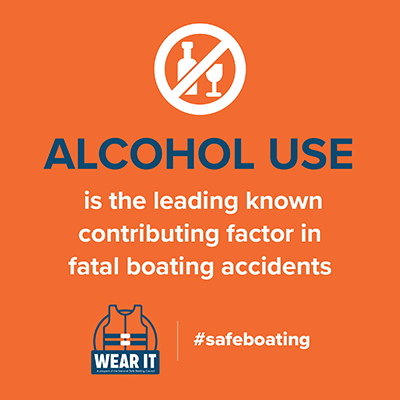
Every year the United States Coast Guard (USCG) publishes a recreational boating statistics report. The United States has seen an average of 113 deaths per year since 2004 where alcohol use was the primary contributing factor to the accident. In 2020, the highest number of deaths (115) were recorded since 2011 (125 deaths). On average, 38 percent of boating accidents involving alcohol have resulted in at least one death since 2007. The annual reports also capture the number of injuries that occur from accidents where alcohol is the primary factor. The 2020 report shows that alcohol contributed to 296 accidents. Of those accidents, there were 260 injuries reported. That’s an 88 percent chance an injury occurred when alcohol caused the boating accident.
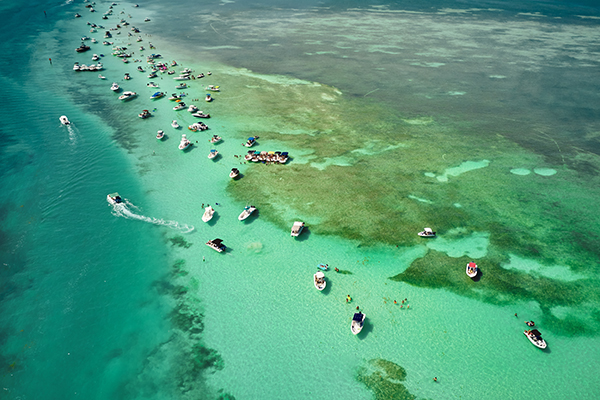
Accidents and fatalities caused by boating under the influence are 100 percent preventable. Just like driving under the influence, if you decide to boat under the influence, you make a conscious choice to put your life and the lives of others around you in danger. Please use these safe boating tips to avoid boating under the influence.
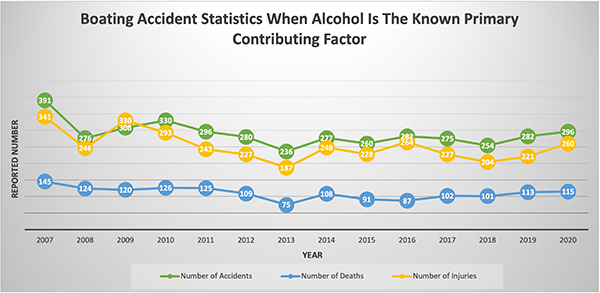
Each vessel should have at least one designated sober operator, though multiple are preferable should a situation arise that prevents a designated sober operator to captain the vessel. Any time you are recreating on the water, it’s important to make sure all required safe boating equipment is on board and all passengers have on an approved life jacket.
“The most important piece of safety gear to wear while boating is a life jacket. This single decision to have everyone on your boat wearing a properly fitted, U.S. Coast Guard-approved life jacket, can make a perfect day on the water a perfect day on the water. The second-best decision a boat operator can make is to boat sober. Alcohol is the leading known contributing factor in fatal boating accidents. It’s an easy formula; wear a life jacket, and boat sober,” said Peg Phillips, executive director of the National Safe Boating Council.
Please keep in mind that boating under the influence doesn’t begin and end at the dock. Be mindful of alcohol consumed before driving to the lake or while visiting a waterfront restaurant by boat. You might be thinking, “One or two drinks won’t hurt.” However, the effects of alcohol are amplified while on the water.
Peg Phillips, executive director of the National Safe Boating Council reminds us that, “Impairment on a boat is very different from being intoxicated on land. The combination of motion and sun can exacerbate symptoms, and boat operators can find themselves in trouble quickly.”
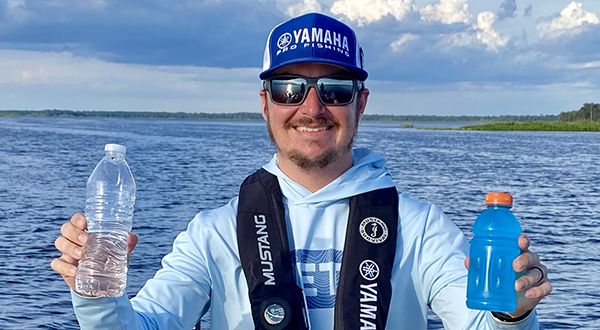
You may be enjoying a Saturday afternoon at the local sandbar with your friends. The sunshine reflecting across the water as music plays and you question your next drink choice. This choice could ultimately change the course of your day. Choosing alcohol may result in intoxication, an increased risk of injury and the inability to serve as a sober operator. A better option would be consuming a water or beverage that contains electrolytes to eliminate your ability to suffer from heat exhaustion.
Boating under the influence doesn’t just apply to the driver. According to the Florida Fish and Wildlife Conservation Commission (FWC), 20 percent of Florida’s boating fatalities in 2021 were alcohol or drug related. Being impaired while on the boat greatly increases your chances for falling overboard and drowning due to your inability to function properly. The 2020 USCG™ report listed 534 deaths by drowning, of which only 14 percent were wearing a life jacket.
“As FWC officers, it is our job to do all we can to ensure that all users of our waterways are safe,” said Maj. Rob Beaton, FWC’s Boating and Waterways Section Leader.
Operation Dry Water kicks off July 2nd – 4th across all 56 United States and territories. Law enforcement officers will prioritize those violating boating under the influence laws, and work to spread awareness regarding the dangers of BUI. According to the National Association of State Boating Law Administrators (NASBLA), in 2021 law enforcement officers contacted 328,627 boaters and made 638 BUI arrests during the Operation Dry Water weekend.
If you are caught boating under the influence, you will face serious penalties and consequences. The punishment varies by state, but you can expect to experience one or more of the following: large fines, jail time, loss of operating privileges, or a felony conviction. A BUI in the state of Oregon can result in a $6,250 fine, jail time and your boating registration cancelled for three years. In South Carolina, felony BUI charges carry penalties up to a $25,000 fine and 25 years of imprisonment. The reality is the risk outweighs the reward no matter where you boat.
As you enjoy time recreating on the water, please be respectful to all law enforcement personnel. Law enforcement personnel are tasked with protecting our waterways, resources and the people that enjoy them. Their job is to eliminate boating under the influence, so please cooperate as vessel safety checks are performed. It’s our responsibility to report a boat in operation that may cause danger. Please contact them if any emergency arises.
Great organizations like Mothers Against Drunk Driving® (MADD®) work tirelessly to end driving under the influence. If we do not get behind the wheel of our vehicle under the influence, then why are we doing it in a boat?
“MADD® wants everyone to understand that a boat is a vehicle, and that boating under the influence is driving under the influence. Impairment by alcohol or any other drugs
on the water is extremely dangerous, both for boat operators and passengers,” said Alex Otte, National President of Mothers Against Drunk Driving® (MADD®).
This boating season, and every season, let’s all make the conscious effort to eliminate boating under the influence.
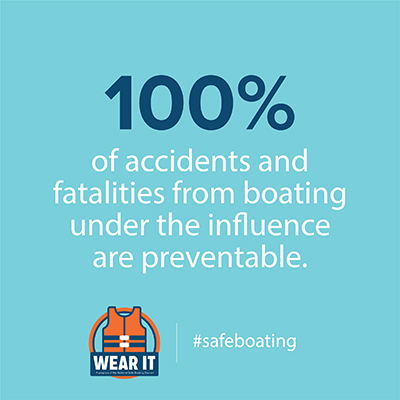
“As someone who lives every day with the consequences of someone else’s choice to boat under the influence, I know that this never had to happen. Boating under the influence of alcohol or other drugs is not an accident, it’s not a mistake, it’s a choice. The message I want people to get is don’t be the one to make the choice that takes someone away from their family, or forces someone to live with injuries that they will truly never recover from, “continued Otte.
Boating under the influence is a choice. Make the right one and leave the booze on the bank.
Back to Blue Life

Every year the United States Coast Guard (USCG) publishes a recreational boating statistics report. The United States has seen an average of 113 deaths per year since 2004 where alcohol use was the primary contributing factor to the accident. In 2020, the highest number of deaths (115) were recorded since 2011 (125 deaths). On average, 38 percent of boating accidents involving alcohol have resulted in at least one death since 2007. The annual reports also capture the number of injuries that occur from accidents where alcohol is the primary factor. The 2020 report shows that alcohol contributed to 296 accidents. Of those accidents, there were 260 injuries reported. That’s an 88 percent chance an injury occurred when alcohol caused the boating accident.

Accidents and fatalities caused by boating under the influence are 100 percent preventable. Just like driving under the influence, if you decide to boat under the influence, you make a conscious choice to put your life and the lives of others around you in danger. Please use these safe boating tips to avoid boating under the influence.
- Designate a sober captain.
- Make sure all required safe boating equipment is onboard the vessel.
- Remember, boating under the influence doesn’t begin and end at the dock.
- Report any dangerous boat operation to local law enforcement.

Each vessel should have at least one designated sober operator, though multiple are preferable should a situation arise that prevents a designated sober operator to captain the vessel. Any time you are recreating on the water, it’s important to make sure all required safe boating equipment is on board and all passengers have on an approved life jacket.
“The most important piece of safety gear to wear while boating is a life jacket. This single decision to have everyone on your boat wearing a properly fitted, U.S. Coast Guard-approved life jacket, can make a perfect day on the water a perfect day on the water. The second-best decision a boat operator can make is to boat sober. Alcohol is the leading known contributing factor in fatal boating accidents. It’s an easy formula; wear a life jacket, and boat sober,” said Peg Phillips, executive director of the National Safe Boating Council.
Please keep in mind that boating under the influence doesn’t begin and end at the dock. Be mindful of alcohol consumed before driving to the lake or while visiting a waterfront restaurant by boat. You might be thinking, “One or two drinks won’t hurt.” However, the effects of alcohol are amplified while on the water.
Peg Phillips, executive director of the National Safe Boating Council reminds us that, “Impairment on a boat is very different from being intoxicated on land. The combination of motion and sun can exacerbate symptoms, and boat operators can find themselves in trouble quickly.”

You may be enjoying a Saturday afternoon at the local sandbar with your friends. The sunshine reflecting across the water as music plays and you question your next drink choice. This choice could ultimately change the course of your day. Choosing alcohol may result in intoxication, an increased risk of injury and the inability to serve as a sober operator. A better option would be consuming a water or beverage that contains electrolytes to eliminate your ability to suffer from heat exhaustion.
Boating under the influence doesn’t just apply to the driver. According to the Florida Fish and Wildlife Conservation Commission (FWC), 20 percent of Florida’s boating fatalities in 2021 were alcohol or drug related. Being impaired while on the boat greatly increases your chances for falling overboard and drowning due to your inability to function properly. The 2020 USCG™ report listed 534 deaths by drowning, of which only 14 percent were wearing a life jacket.
“As FWC officers, it is our job to do all we can to ensure that all users of our waterways are safe,” said Maj. Rob Beaton, FWC’s Boating and Waterways Section Leader.
Operation Dry Water kicks off July 2nd – 4th across all 56 United States and territories. Law enforcement officers will prioritize those violating boating under the influence laws, and work to spread awareness regarding the dangers of BUI. According to the National Association of State Boating Law Administrators (NASBLA), in 2021 law enforcement officers contacted 328,627 boaters and made 638 BUI arrests during the Operation Dry Water weekend.
If you are caught boating under the influence, you will face serious penalties and consequences. The punishment varies by state, but you can expect to experience one or more of the following: large fines, jail time, loss of operating privileges, or a felony conviction. A BUI in the state of Oregon can result in a $6,250 fine, jail time and your boating registration cancelled for three years. In South Carolina, felony BUI charges carry penalties up to a $25,000 fine and 25 years of imprisonment. The reality is the risk outweighs the reward no matter where you boat.
As you enjoy time recreating on the water, please be respectful to all law enforcement personnel. Law enforcement personnel are tasked with protecting our waterways, resources and the people that enjoy them. Their job is to eliminate boating under the influence, so please cooperate as vessel safety checks are performed. It’s our responsibility to report a boat in operation that may cause danger. Please contact them if any emergency arises.
Great organizations like Mothers Against Drunk Driving® (MADD®) work tirelessly to end driving under the influence. If we do not get behind the wheel of our vehicle under the influence, then why are we doing it in a boat?
“MADD® wants everyone to understand that a boat is a vehicle, and that boating under the influence is driving under the influence. Impairment by alcohol or any other drugs
on the water is extremely dangerous, both for boat operators and passengers,” said Alex Otte, National President of Mothers Against Drunk Driving® (MADD®).
This boating season, and every season, let’s all make the conscious effort to eliminate boating under the influence.

“As someone who lives every day with the consequences of someone else’s choice to boat under the influence, I know that this never had to happen. Boating under the influence of alcohol or other drugs is not an accident, it’s not a mistake, it’s a choice. The message I want people to get is don’t be the one to make the choice that takes someone away from their family, or forces someone to live with injuries that they will truly never recover from, “continued Otte.
Boating under the influence is a choice. Make the right one and leave the booze on the bank.
Back to Blue Life
